Digital currencies redefine money as well as commerce by breaking traditional boundaries, opening opportunities for spending. As guides like "How to Buy Cryptocurrency for Beginners" make entry easier, many ask, "what can you buy with cryptocurrency?" This question reflects growing interest in the practical uses of these assets.
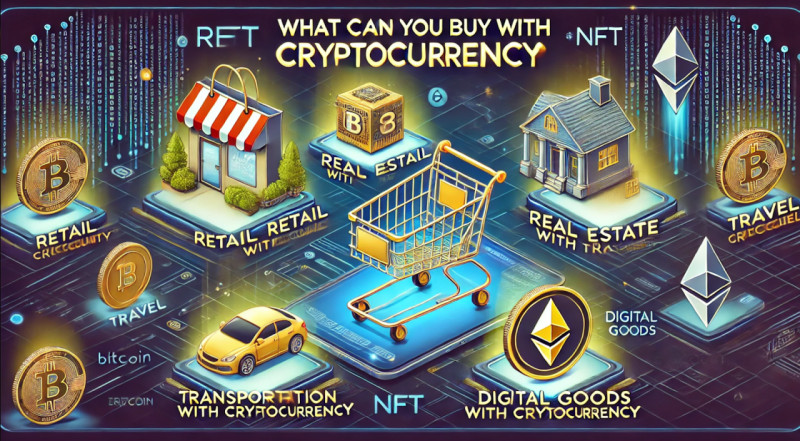
Practical Applications of Digital Assets
Everyday Transactions. Digital funds have moved beyond trading, investments into real-world use, embraced by companies, local businesses, nonprofits.
- Retail options: global chains now accept these payments for electronics, clothing, groceries.
- Gift cards: use platforms for acquiring gift cards for sites like Amazon or eBay, making digital currencies more versatile.
- Local adoption: cafes, restaurants, boutiques increasingly offer payment systems to accept these funds.
High-Tech Transactions. Tech companies are early adopters of digital payments, leveraging them across services.
- Cloud platforms: use digital funds for storage solutions or software subscriptions.
- Streaming services: subscribe to content platforms using these assets for a seamless payment experience.
Enhancing Travel, Leisure
Booking travel. The travel industry has integrated digital currencies for cross-border ease.
- Airlines, hotels: book through agencies or platforms like Expedia.
- Tourism experiences: purchase guided tours, adventure activities using digital funds.
Event access. From concerts to festivals, event organizers now offer ticketing systems that accept these payments, simplifying the user experience.
Supporting Creativity, Art
Tokenized collectibles. NFTs revolutionize how creators sell, monetize their work.
- Digital art: platforms like OpenSea or Rarible enable ownership of exclusive art pieces.
- Music: buy albums or exclusive releases directly from artists.
- Memberships: access clubs tied to creative or collectible projects.
Philanthropy, Social Impact
Donations, campaigns. Transparency along with accessibility make digital currencies a favorite for nonprofits.
- Charitable giving: organizations such as UNICEF accept these contributions globally.
- Crowdfunding: support causes or campaigns directly, bypassing intermediaries.
- Blockchain impact: transparency ensures donors see how contributions are allocated.
Enhancing Opportunities
Gaming Ecosystems. Gaming platforms leverage digital assets to enhance user experiences.
- In-game items: acquire skins, weapons, or avatars.
- Virtual spaces: invest in digital real estate or metaverse avatars.
- Memberships: subscribe to gaming services like PlayStation Network.
Education. Learning platforms, institutions use digital funds to streamline payments.
- Online learning: sites like Coursera allow students to enroll with these assets.
- Tuition: progressive universities now accept Bitcoin for fees.
Bridging Virtual, Physical Economies
Hybrid payments. Digital currencies combine seamlessly with traditional systems.
- Retail Integration: Some stores accept a mix of digital and fiat currencies.
- Subscriptions: Use assets for partial payments or bundles spanning services.
Privacy, efficiency. Digital payments often prioritize user privacy, ensuring secure transactions without intermediaries.
Overcoming Challenges
Regulatory hurdles. Users must navigate legal complexities:
- Region-specific rules: local regulations impact where as well as how funds are accepted.
- Taxation: awareness of taxable events ensures compliance.
Stability solutions. Volatility is a concern, but stablecoins mitigate risks:
- Stablecoin adoption: pegged values provide predictable payment options.
- Merchant education: informing sellers ensures smoother integration.
A New Financial Frontier
Exploring the buying potential of cryptocurrency reveals its evolving role in commerce. These assets, once speculative, now serve as practical instruments reshaping industries, empowering users. Digital currencies continue to challenge conventions, paving the way for a redefined financial ecosystem that connects consumers, businesses, value in unprecedented ways.
What Is Cryptocurrency and How Can It Be Used?
The question "what can you buy with cryptocurrency" opens a window into comprehending these revolutionary assets, their transformative role in modern finance. As decentralized, secure, fast alternatives to traditional money, digital currencies are reshaping how individuals as well as businesses interact with value. Their adoption extends across industries, creating possibilities previously unattainable in conventional systems.
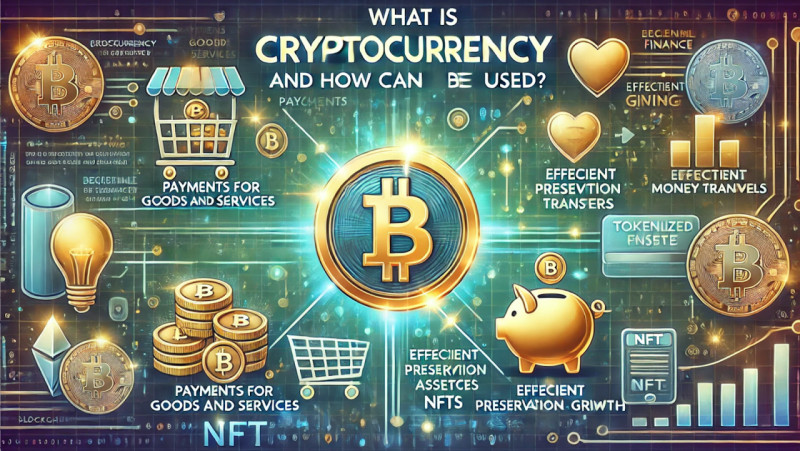
Definition of Cryptocurrency
These assets are digital forms of value safeguarded by cryptographic technology. Unlike physical money or government-issued currencies, they rely on decentralized networks like blockchain to operate independently of centralized control. Each transaction undergoes verification by a network of participants rather than a central authority, ensuring integrity along with reliability.
Examples of popular digital currencies:
- Bitcoin (BTC): often called "digital gold," Bitcoin is widely recognized for its use in storing, transferring value.
- Ethereum (ETH): known for its ability to execute smart contracts, power decentralized applications.
- Litecoin (LTC): created for fast, cost-effective transactions.
- Stablecoins: currencies like USDT or USDC are tied to fiat money, providing stability in otherwise volatile markets.
Key Characteristics
Decentralization | Transactions occur on peer-to-peer networks without relying on intermediaries like banks or governments. This structure removes unnecessary delays, fees, offering direct access to financial systems worldwide |
Security | Built with cryptographic methods, digital assets are highly secure. Once verified, transactions cannot be altered, reducing risks associated with fraud |
Transparency | While user identities remain anonymous, the details of each transaction are recorded on public blockchains. This ensures a balance of privacy along with accountability, fostering trust across participants |
Main Uses of Cryptocurrency
These versatile assets have grown far beyond speculative tools. Today, they provide solutions for payments, investments, donations, more.
Payments for goods, services. Many businesses integrate digital currencies as a payment option due to their speed, global compatibility. Consumers can use them to pay for everything from everyday items to high-value purchases, including:
- Tech products: online retailers offering hardware, software, cloud services.
- E-commerce: platforms that accept these currencies enable seamless cross-border transactions.
- Restaurants, cafes: particularly in tech-friendly regions, businesses accept Bitcoin or Ethereum for meals, drinks.
Wealth preservation, growth. Individuals increasingly use these assets to protect wealth against inflation or as a high-risk, high-reward investment. Holding Bitcoin or similar assets long-term, known as "HODLing," is a popular strategy among enthusiasts.
Efficient money transfers. For international remittances, digital currencies eliminate the need for costly intermediaries. Funds are sent directly from one party to another, saving time, reducing fees.
Charitable giving. Blockchain technology enables greater transparency for donations. Donors can track their contributions, ensuring funds reach their intended purposes. Organizations like UNICEF or the Red Cross are pioneering this space.
DeFi (Decentralized Finance). DeFi platforms allow individuals to participate in activities like lending, borrowing without involving banks. Users earn interest on holdings or borrow funds backed by digital collateral.
Tokenized assets, NFTs. Through blockchain, physical as well as digital items can be tokenized, granting fractional ownership or unique digital certificates. Examples include:
- NFTs: Representing ownership of art, music, or digital collectibles.
- Real Estate: Fractional investments in properties using tokenized assets.
Why It’s Gaining Popularity
Digital currencies are gaining traction because they address inefficiencies in traditional systems if you know what can you buy with cryptocurrency.
- Fast transactions: they bypass slow clearinghouses, enabling instant payments across borders.
- Lower costs: especially for global transactions, fees are minimal compared to traditional banking or remittance services.
- Financial inclusion: digital assets provide access to financial systems for unbanked populations, eliminating barriers imposed by geography or bureaucracy.
Digital currencies offer more than just a new way to transact; they redefine economic possibilities. From bridging the gap in cross-border payments to enabling tokenized ownership, decentralized lending, their applications span diverse fields. As adoption continues to grow, these assets will likely play an increasingly central role in transforming global commerce, reshaping financial systems for future generations.
Everyday Purchases
The question of buying power of cryptocurrency is no longer limited to niche audiences or tech-savvy individuals. Today, digital currencies are reshaping daily expenses, offering innovative as well as convenient alternatives for routine transactions. Whether paying for meals, upgrading your wardrobe, or grocery shopping, these assets are carving a significant role in everyday commerce.

Food, Dining
Dining out has become one of the simplest ways to use digital currencies. From fine dining to quick coffee runs, businesses are recognizing the need for flexible payment methods.
Restaurants. Restaurants worldwide, particularly in metropolitan, tech-forward areas, now accept digital payments. Upscale venues in New York, London, or Tokyo cater to customers who prefer Bitcoin or Ethereum. Small, independent eateries are also leveraging this trend to attract younger, tech-driven clientele.
Food delivery services. Delivery platforms are integrating blockchain-based payment options, making it easier for users to pay directly from their digital wallets. While large platforms like Uber Eats are exploring this technology, niche services specializing in alternative payment systems lead the way. This innovation caters to busy individuals who embrace the digital economy for their convenience.
Coffee shops. Chains like Starbucks, through partnerships with platforms like Bakkt, allow customers to pay with digital assets. Independent cafes, especially in tech hubs, are following suit. Paying for a cappuccino or latte has never been more forward-thinking.
Retail Shopping
Retail has embraced digital currencies, enabling consumers to shop for diverse products using alternative assets.
Clothing, accessories. Fashion brands, from major retailers to boutique designers, are incorporating blockchain-based payments. E-commerce platforms like Shopify empower businesses to offer digital options, attracting younger customers who value individuality, tech innovation.
Electronics. Tech retailers were among the first to adopt blockchain technology, enabling customers to pay for gadgets, computers, accessories with digital currency. Names like Newegg or Overstock are prominent in this space, making it easier to shop for cutting-edge devices using equally modern payment options.
Home Goods. Furniture as well as home goods stores are enhancing their payment capabilities, allowing customers to use digital assets for home decor, smart products. Online platforms offering unique designs or minimalist styles are leading this integration, making home upgrades easier than ever.
Groceries
Groceries highlight how digital currencies address practical needs alongside luxury items that’s why the list of what can you buy with cryptocurrency is growing.
Supermarkets. Large grocery chains are beginning to accept digital payments, catering to customers wanting to use these assets for daily necessities. Tech-savvy regions are at the forefront of this shift, demonstrating growing adoption.
Grocery delivery services. Platforms like CryptoRefills are pioneering blockchain-based payments for online grocery delivery. Customers enjoy the convenience of paying directly with digital assets without relying on fiat conversions.
Specialty food stores. Smaller markets offering organic or specialty foods are embracing these innovations. Often appealing to progressive shoppers, these stores make digital payments a natural addition for their customer base.
Why Everyday Use Matters
Using digital currencies for essentials signals their evolution beyond investments. Paying for meals, clothes, or groceries shows how versatile, practical they’ve become. It also underscores their ability to transform financial systems into more inclusive, adaptable models.
As businesses expand digital payment options, integrating blockchain-powered assets into daily life becomes effortless. This adoption enhances convenience, drives innovation, reshaping our approach to money. Whether dining out, shopping for fashion, or restocking your pantry, this is a glimpse into the future of finance—one transaction at a time.
Luxury Items
The question of the buying power of cryptocurrency now encompasses high-end luxury markets where exclusivity, innovation meet cutting-edge technology. Blockchain-based transactions are reshaping access to premium products, providing seamless, secure options for enthusiasts seeking exceptional experiences. From luxury vehicles to rare collectibles, digital assets are redefining the way people engage with exclusivity.
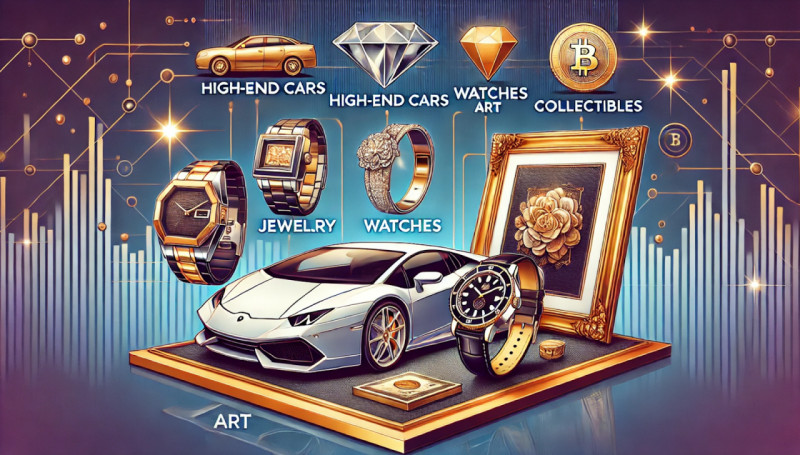
High-End Cars
Blockchain transactions are transforming the way premium automobiles are acquired, offering streamlined, efficient solutions for discerning buyers.
Tesla, Electric Pioneers
Tesla made waves by briefly accepting Bitcoin as payment, signaling the auto industry's willingness to integrate blockchain technology. While Tesla’s policy has shifted, the move set a precedent for other electric vehicle manufacturers. Brands focusing on sustainable innovation are increasingly offering customers the option to pay with digital assets, reinforcing their forward-thinking ethos.
Sports Cars, Supercars
Top-tier brands like Porsche, Lamborghini, Bugatti collaborate with select dealerships to facilitate blockchain transactions. These dealerships cater to clients who prioritize speed, precision, exclusivity. Blockchain-based payments simplify the process, enabling buyers to secure high-performance vehicles without navigating complex financial systems.
Vintage, Collectible Vehicles
For car collectors, rare, vintage models are now accessible through auction houses, specialty dealers integrating blockchain payments. Whether seeking a classic Porsche or a one-of-a-kind concept car, these transactions provide enhanced transparency along with efficiency, allowing collectors to focus on acquiring their dream vehicles with confidence.
Jewelry, Watches
The jewelry as well as watch industries have embraced blockchain technology, allowing buyers to combine elegance with innovative payment methods.
Iconic Timepieces
Renowned brands like Rolex, Patek Philippe, Audemars Piguet are increasingly available through retailers that accept alternative payment methods. Limited-edition, bespoke models are particularly popular among digital asset users, who appreciate the streamlined, secure process of acquiring high-value pieces.
Bespoke Jewelry
Custom designers are modernizing luxury by integrating blockchain-based payment systems. Clients can now commission exclusive creations featuring rare gemstones or intricate designs, using digital assets to complete the transaction. This blend of timeless craftsmanship, modern technology elevates the overall experience and expands the list of what can you buy with cryptocurrency.
Provenance, Authenticity
Blockchain integration in the jewelry market ensures that customers can verify the origin, quality of their purchases. By offering a transparent, immutable trail of ownership, blockchain not only enhances trust but also adds an additional layer of value to luxury acquisitions.
Art, Collectibles
The art world has undergone a digital transformation, with blockchain technology revolutionizing how collectors secure both physical and digital masterpieces.
Fine Art Galleries
Contemporary art galleries have started accepting blockchain payments, simplifying the acquisition of high-value works. Buyers can participate in global auctions, view online catalogs, secure coveted pieces with efficiency. This evolution reflects the art industry’s embrace of technological advancements.
Non-Fungible Tokens (NFTs)
NFTs have created a new dimension of ownership in the art world. Collectors can now own unique digital works, including animations, music, virtual real estate, through platforms like OpenSea or Foundation. Blockchain ensures authenticity, enabling artists as well as buyers to engage in direct, secure transactions.
Rare Memorabilia
Collectible items, from vintage coins to limited-edition sports memorabilia, are becoming increasingly accessible through platforms that accept blockchain payments. This innovation simplifies the process, offering both buyers and sellers a secure, transparent marketplace for rare, valuable items.
Why Luxury Markets Are Embracing Blockchain
The principles of transparency, efficiency, exclusivity inherent in blockchain technology make it an ideal fit for luxury markets. High-value transactions benefit from the speed, security provided by decentralized systems, ensuring a seamless process for both buyers and sellers.
For consumers, using digital assets to acquire luxury items is more than a transaction—it’s a reflection of a progressive lifestyle. Whether purchasing a bespoke diamond necklace, a rare piece of digital art, or a high-performance sports car, these transactions combine innovation with sophistication. Blockchain payments are not just reshaping commerce but redefining the meaning of luxury itself.
Travel and Experiences
The question of the buying power of cryptocurrency has taken a significant step into the travel, adventure industry, transforming how people plan, experience their journeys. From flights, hotel stays to car rentals, exclusive activities, alternative payment methods offer flexibility along with innovation. This integration provides a seamless way to explore the world while embracing modern financial solutions.
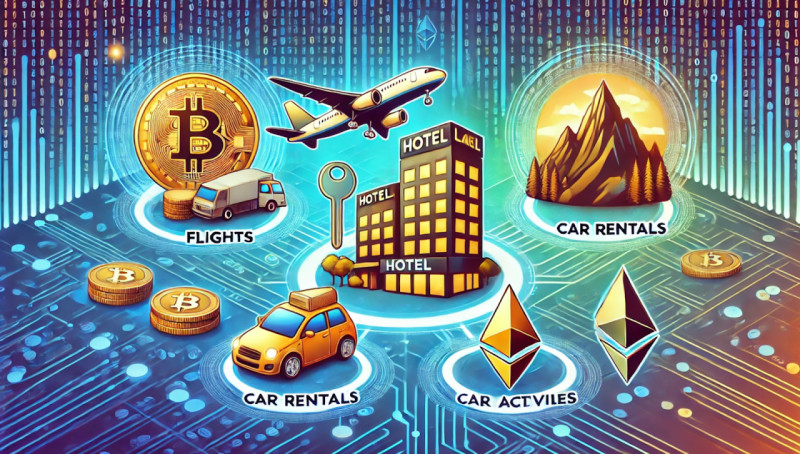
Flights, Hotels
Travelers are no longer restricted to traditional banking or credit card systems when booking trips. Alternative payments provide a global solution for planning journeys with convenience as well as efficiency.
Airlines Accepting Digital Payments
Airlines like AirBaltic or LOT Polish Airlines have adopted blockchain-based transactions, allowing passengers to book flights with ease. These options eliminate the complications of currency conversions, bank processing delays, especially for international routes. By embracing this technology, airlines appeal to a tech-savvy demographic eager for streamlined processes.
Comprehensive Travel Platforms
Platforms like Travala have revolutionized trip planning by enabling users to arrange flights, accommodations, activities all in one place using alternative payments. These platforms are designed to simplify the booking process while offering competitive pricing, partnerships with major travel providers. This approach creates a holistic solution for modern travelers and extends the list of what can you buy with cryptocurrency.
Accommodations for Every Budget
Hotels worldwide, from luxury resorts to budget-friendly stays, now accept blockchain transactions. This trend includes boutique hotels, international chains, allowing tourists to enjoy seamless check-ins, checkouts without dealing with traditional payment hurdles. Platforms like Expedia have also integrated these options, making it easier to access a variety of choices.
Car Rentals
Transportation is a vital aspect of any journey, rental companies have embraced blockchain payments to improve accessibility along with convenience for travelers.
Leading Rental Agencies
Global names such as Hertz or Sixt have partnered with third-party services to offer alternative payment solutions. This innovation caters to international travelers, eliminating the inconvenience of local currency exchanges or additional fees.
Streamlined Rentals
Blockchain transactions ensure faster processing, allowing customers to book, confirm rentals instantly. Travelers can secure vehicles for specific durations without delays, ensuring a smooth experience from arrival to departure.
Luxury, Specialty Vehicles
For those seeking a premium travel experience, rental companies offer exotic vehicles like Lamborghinis, Ferraris, or Teslas through blockchain-enabled services. These options appeal to those who want their mode of transportation to align with the elegance of their destination.
Adventure Activities
Blockchain-based payments have unlocked a new level of accessibility to thrilling, memorable activities. Operators across the globe are catering to adventurers by adopting these innovative methods.
Outdoor Adventures
Activities like skydiving, bungee jumping, or scuba diving are now easier to book through platforms that accept blockchain transactions. Whether in tropical paradises or mountainous regions, adventure-seekers can secure their experiences instantly, without friction.
Guided Tours, Cultural Experiences
Tour operators providing wildlife safaris, city tours, or historical explorations are increasingly using alternative payment systems. This shift ensures that participants from around the world can easily access these services, regardless of their banking situation.
Luxury, Space Tourism
For those seeking once-in-a-lifetime adventures, blockchain payments make booking exclusive activities, such as hot air balloon rides or yacht charters, more accessible. Companies exploring space tourism, like SpaceX, are also paving the way for blockchain-based payment systems, making the dream of space travel closer to reality.
Why the Travel Industry is Embracing Blockchain Payments
The travel sector thrives on delivering efficient, seamless, innovative services to its customers. Blockchain technology aligns perfectly with these goals by eliminating intermediaries, reducing fees, providing global accessibility. These payments create a frictionless experience for travelers, bypassing challenges like fluctuating exchange rates or delays in processing.
Tourists benefit from a streamlined approach that allows them to plan, book, experience travel with ease. From booking accommodations to securing adventure activities, blockchain-enabled transactions reflect a forward-thinking mindset in global exploration. Using alternative payments not only makes travel more accessible but also supports the shift toward a modern, interconnected world where borders, barriers to financial systems are diminishing.
By embracing this technology, travelers gain access to faster, safer, more inclusive options. Whether booking an international flight, reserving a luxury hotel suite, or embarking on an unforgettable adventure, blockchain payments are making the process simpler, smarter, more aligned with the future of travel.
Digital Goods, Subscriptions
Expanding on what can you buy with cryptocurrency, digital goods, subscriptions showcase a wide range of modern applications. From streaming entertainment, gaming to using advanced software, these assets simplify access to everyday services. Catering to tech-savvy users as well as casual consumers alike, they open up seamless possibilities for enjoying, utilizing virtual platforms.
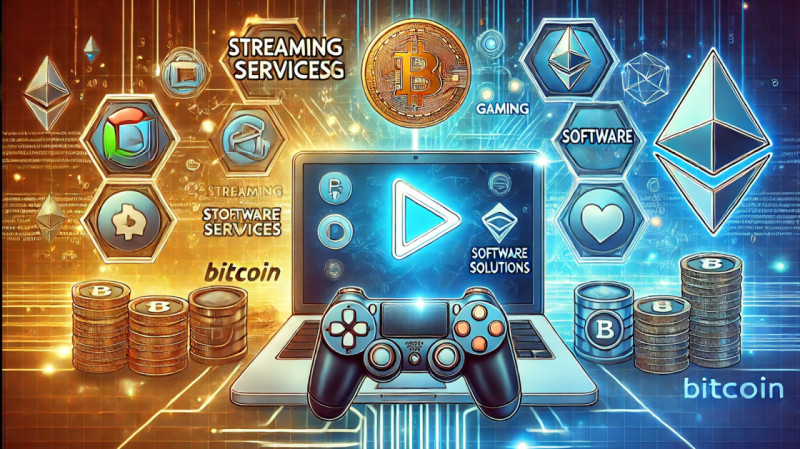
Streaming Services
Entertainment platforms are increasingly incorporating blockchain-based transactions, making it easier for users to enjoy on-demand content. From videos to live performances, these methods offer simplicity along with inclusivity.
Video Streaming
Platforms like Twitch are integrating blockchain payments for subscriptions, direct creator support. This approach enhances engagement by allowing fans to contribute to creators across borders with minimal barriers.
Music Platforms
Music streaming services now offer premium subscriptions payable with digital assets. Features like ad-free playback, offline listening, exclusive tracks become easily accessible for users in regions with limited traditional banking options.
On-Demand Movies
Independent services, major providers enable viewers to rent or own films, shows through blockchain payment systems. This creates an inclusive experience for global users, offering a convenient alternative to conventional methods.
Gaming
Interactive entertainment is a natural fit for blockchain-based payments, with gamers embracing innovative ways to engage with content.
Full Game Access
Digital storefronts are integrating blockchain transactions, enabling users to acquire the latest titles. Whether for PCs, consoles, or mobile platforms, gamers can skip conventional currency exchange, transact directly.
In-Game Purchases
Blockchain enables players to unlock exclusive items, including characters, skins, or weapons. These microtransactions are processed instantly, offering a smoother experience compared to traditional payment systems.
Gaming Memberships
Popular subscription services like Xbox Game Pass or PlayStation Plus are exploring blockchain integration. This innovation gives players flexible, borderless options to manage memberships, access extensive libraries.
Blockchain-Driven Games
Many games built on blockchain technology feature native tokens or assets. These allow players to trade, earn, use items within decentralized ecosystems, creating player-driven economies, more interactive experiences.
Software Solutions
With productivity as well as creativity tools essential in daily life, many providers now accept blockchain payments, catering to a global audience.
Creative Tools
Graphic design as well as video editing platforms provide subscription models payable with blockchain assets. Professionals, freelancers benefit from simplified access, particularly when working across regions.
Collaboration Platforms
Project management, cloud-based collaboration tools increasingly integrate blockchain payments. These features streamline subscription management, eliminate complications like international transaction fees.
Educational Services
Online learning platforms offering courses in areas like coding, design, language acquisition now support blockchain-based transactions. This enhances accessibility for users worldwide, creating opportunities for learning without geographic or financial barriers.
Why Blockchain Transactions Enhance Digital Goods, Subscriptions
Using blockchain for virtual services removes traditional obstacles, such as currency exchange fees or processing delays. It promotes a borderless environment, ensuring users from any location can access products or services without restrictions.
For providers, accepting blockchain assets increases market reach, sets a forward-thinking standard. Consumers, however, benefit from efficiency, global access, independence from traditional banking systems.
Streaming the latest shows, leveling up in online games, or upgrading professional software becomes straightforward, inclusive through blockchain. These advancements highlight how digital assets enhance daily virtual interactions, bridging convenience with innovation.
Investing, Financial Services
Exploring what can you buy with cryptocurrency uncovers a wealth of opportunities in investment, financial services, demonstrating how blockchain assets are reshaping traditional methods of wealth management. From precious metals to decentralized finance (DeFi), these options offer innovative pathways for portfolio diversification, value preservation, financial empowerment.
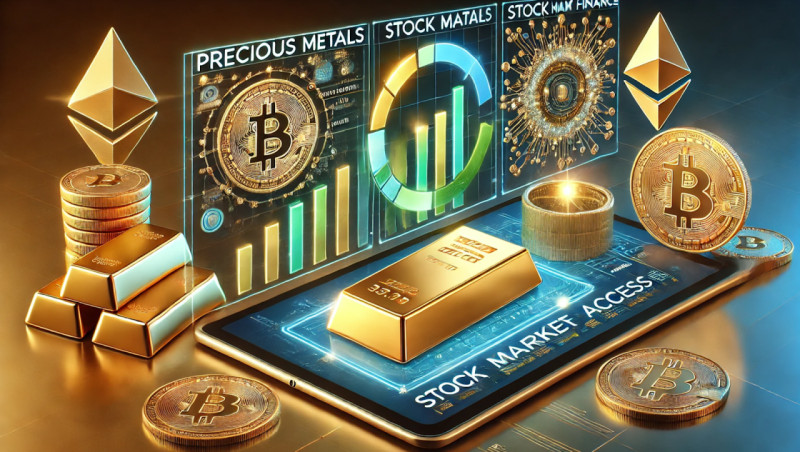
Precious Metals
Gold along with silver have long been prized for their stability, intrinsic value, especially during economic uncertainty. With blockchain-based payments, acquiring these metals is now simpler as well as more efficient.
Gold, Silver Acquisition
Platforms specializing in bullion sales now accept blockchain transactions, enabling users to directly exchange assets for physical gold, silver, or other metals. These transactions often bypass the complexities of traditional banking systems, streamlining the entire process.
Why choose precious metals:
- Global availability: metals are accessible without requiring banking approvals or financial middlamen.
- Stability: converting fluctuating blockchain assets into metals helps safeguard value during volatile market conditions.
- Transparency: every transaction leaves an immutable record, ensuring buyers have clear documentation of their purchases.
Leading vendors:
Renowned platforms such as APMEX or JM Bullion allow users to utilize blockchain solutions, merging trusted investment options with modern payment methods.
This approach enables individuals to preserve wealth while accessing a global marketplace for precious metals.
Stock Market Access
Blockchain technologies are breaking down barriers between decentralized assets, traditional equity markets, enabling seamless participation in stock investments.
Blockchain Meets Equity
Innovative platforms have introduced methods for converting blockchain currencies into stocks as well as funds. These systems allow users to invest in major companies or index funds without the need for fiat conversions.
Tokenized stocks:
One of the most exciting developments is tokenized stocks, where shares of companies like Apple or Tesla are represented as blockchain tokens. This enables individuals to own fractional shares, making high-value equities accessible to all investors.
Key benefits of tokenized equity:
- Fractional ownership: even those with limited capital can invest in partial shares.
- Global reach: removing geographic limitations ensures access to markets traditionally restricted by location.
- Faster settlement: blockchain systems process transactions in near real-time, avoiding lengthy settlement periods.
Innovative platforms:
Services like eToro or FTX enable users to leverage blockchain for equity investments, providing new opportunities to diversify wealth while maintaining transparency, efficiency.
Decentralized Finance (DeFi)
DeFi represents the most groundbreaking application of blockchain assets, offering financial services without centralized control. From lending as well as borrowing to earning competitive interest rates, DeFi provides accessible, user-driven alternatives to traditional banking.
Earning Interest
Platforms such as BlockFi or Celsius allow users to deposit holdings, earn interest at rates often exceeding those of conventional savings accounts. This enables individuals to grow their wealth passively while maintaining control over their assets.
Lending, Borrowing
Services like Aave or Compound let users lend their holdings to earn rewards or borrow against them as collateral. These systems bypass credit checks, other traditional barriers, empowering a broader audience to access financial services and broaden the list of what can you buy with cryptocurrency.
What makes DeFi unique:
- Transparency: transactions are visible on public ledgers, reducing fraud, promoting trust.
- Accessibility: anyone with internet access can participate, removing the need for bank accounts.
- Autonomy: users retain full control over their holdings, unlike centralized systems that rely on intermediaries.
Yield Farming
Yield farming has become a popular strategy within DeFi, allowing users to provide liquidity to platforms, earn returns. Although it involves calculated risks, this method appeals to experienced investors seeking high-reward opportunities.
Transforming Investments
The ability to engage in diverse financial activities using blockchain assets demonstrates their transformative potential. From securing tangible assets like gold to accessing equities, leveraging DeFi tools, blockchain enables individuals to achieve greater flexibility along with control over their investments.
These innovations are reshaping how wealth is managed, providing efficient, transparent, globally accessible solutions. Blockchain assets are not just tools for transactions—they are pathways to sustainable growth, financial independence, marking a significant shift in how modern investments are approached.
Charitable Donations, Social Impact
The question of the buying power of cryptocurrency goes far beyond personal purchases, extending into transformative areas like charitable giving, community empowerment. By leveraging blockchain technology, people can contribute directly to causes, fund grassroots projects, provide disaster relief with unprecedented transparency as well as efficiency. These innovations are reshaping philanthropy, creating meaningful opportunities to support global, local initiatives.
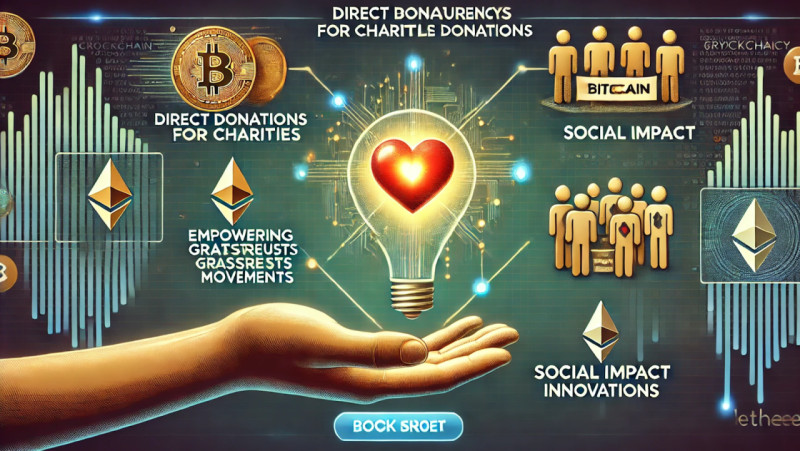
Direct Donations to Charities
Blockchain has become a game-changer for nonprofit organizations. Accepting digital assets allows charities to simplify donation processes while reaching donors worldwide.
Charities Leading the Way
- UNICEF: by using blockchain, UNICEF ensures donations reach their destination quickly, efficiently, funding programs for children in underserved areas.
- The water project: aimed at solving water scarcity issues in Sub-Saharan Africa, this organization accepts Bitcoin, similar assets to fund clean water infrastructure.
- GiveCrypto: dedicated to helping those in need, GiveCrypto distributes financial assistance in the form of blockchain-based assets, allowing recipients direct access to funds without intermediaries.
Benefits of Blockchain Donations
Transparency: blockchain’s public ledger allows donors to track contributions, building trust by verifying where funds go, how they’re used.
Lower fees: traditional cross-border transactions often incur high charges. Blockchain drastically reduces these costs, ensuring more funds directly benefit the cause.
Speed: during emergencies, such as natural disasters, immediate access to funds is crucial. Blockchain transactions provide near-instant processing, allowing organizations to deploy resources quickly.
How to Get Started
- Choose a recognized charity accepting blockchain contributions.
- Send assets securely through a wallet or payment platform.
- Retain transaction IDs for records or tax benefits.
Donating through blockchain creates a straightforward path for supporting impactful initiatives with minimal administrative overhead.
Empowering Grassroots Movements Through Crowdfunding
Crowdfunding with blockchain is revolutionizing how individuals, communities raise funds for projects, innovations, or urgent needs. Platforms accepting digital currencies connect contributors with causes, providing global accessibility, cutting out intermediaries.
Examples of Blockchain Crowdfunding
- Creative ventures: platforms like Gitcoin support open-source projects, enabling developers to secure funding directly from backers.
- Social campaigns: services such as BitHope focus on funding social causes, including disaster relief, education initiatives, poverty reduction and broaden the list of what can you buy with cryptocurrency.
Advantages of Blockchain Crowdfunding
Global reach: anyone with internet access can contribute, bypassing geographical or banking restrictions.
Direct impact: contributions flow straight to creators or organizers, reducing delays and ensuring the funds reach their intended use.
Inclusive participation: blockchain supports microdonations, encouraging widespread involvement, regardless of financial means.
Supporting Crowdfunding Efforts
- Research campaigns to know their goals, intended impact.
- Use platforms offering transparency, often enforced through smart contracts.
- Stay updated on campaign progress to see how contributions are utilized.
This model empowers communities to take charge of their needs, innovations, fostering change from the ground up.
Social Impact Innovations
Blockchain has enabled innovative solutions that expand its role beyond donations, crowdfunding. These applications address systemic challenges, offer sustainable ways to improve lives.
Universal basic income (UBI). Programs like GoodDollar use blockchain to distribute income universally, targeting global inequality, helping low-income populations gain financial stability.
Disaster relief. Organizations such as Binance Charity deploy blockchain technology to deliver aid during crises. These transparent, rapid transfers ensure that relief reaches those in need without unnecessary delays or administrative costs.
Microfinance. Blockchain simplifies microloans, empowering small business owners in underserved regions. By leveraging this technology, platforms like Kiva help entrepreneurs grow their ventures with accessible, secure financing.
The Future of Philanthropy
Integrating blockchain into social impact initiatives not only enhances efficiency but also creates opportunities for individuals along with organizations to make a tangible difference.
- For donors, it offers unparalleled transparency, showing exactly how their contributions are used.
- For charities, blockchain reduces operational costs, enabling more funds to be directed toward their mission.
- For communities, it creates faster, more reliable access to critical resources, financial support.
As the adoption of blockchain technology continues to expand, its potential to transform philanthropy grows. Whether through direct donations, crowdfunding innovative projects, or supporting social impact initiatives, these advancements highlight the immense possibilities for creating a better, more connected world.
Every transaction becomes more than just an exchange of value—it becomes a step toward meaningful change. Blockchain contributions allow individuals to impact global issues effectively, empowering both donors and recipients to engage in shaping a brighter future.
Everyday Services
The question of the buying power of cryptocurrency highlights its growing role in securing everyday services. From freelance projects to education, wellness, digital assets simplify transactions, offering flexibility, inclusivity for global users. These applications empower individuals to access skills, resources, experiences efficiently in an increasingly decentralized economy.
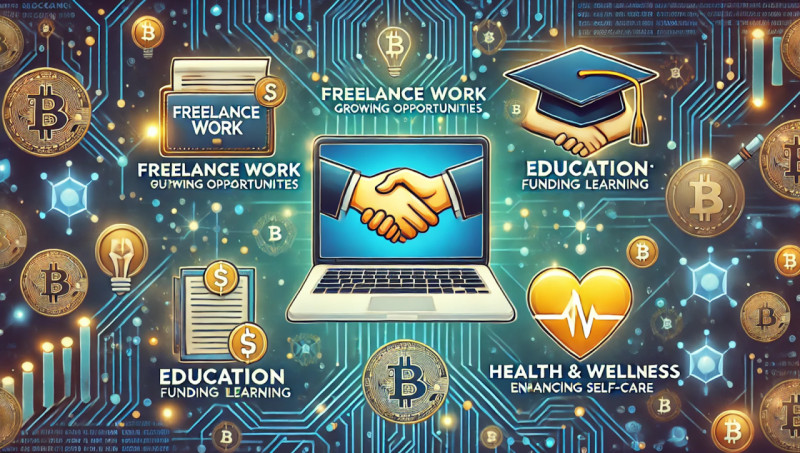
Freelance Work: Growing Opportunities
Cryptocurrencies have revolutionized freelancing, enabling professionals to collaborate with clients globally while avoiding traditional financial systems.
Platforms Supporting Blockchain Transactions
- Specialized freelance sites: platforms like CryptoTask or LaborX connect freelancers with clients, facilitating secure payments in Bitcoin or similar assets. Services include graphic design, coding, consulting.
- Direct agreements: independent contractors often bypass intermediaries, arranging payments directly with clients via wallets.
Benefits for Freelancers
Global accessibility: payments in blockchain-based assets remove conversion hurdles, making international collaboration seamless.
Lower costs: compared to high fees from services like PayPal, blockchain networks offer cost-efficient solutions.
Fast processing: payments clear almost instantly, reducing waiting periods associated with bank transfers.
Practical Tips
- Use platforms with verified clients to minimize risks.
- Set clear terms, including upfront deposits or milestone payments.
- Secure funds with trusted wallets, enable two-factor authentication for added protection.
Blockchain-based payments create a streamlined, inclusive environment for freelancers, fostering cross-border connections without unnecessary fees when the question “what can you buy with cryptocurrency” arises.
Education: Funding Learning with Blockchain
Educational platforms, institutions are increasingly accepting cryptocurrencies, allowing students to access courses, certifications, or degree programs with minimal barriers.
Institutions Supporting Blockchain
- Universities: forward-thinking schools like the University of Nicosia accept Bitcoin for tuition payments.
- Online platforms: websites like BitDegree or Udemy offer blockchain payment options for various courses, ranging from tech skills to business management.
Benefits of Using Blockchain for Education
Lower costs: students save on fees typically associated with international transactions.
Freedom from exchange rates: direct payments in Bitcoin or Ethereum simplify enrollment in global courses, eliminating currency conversions.
Global reach: blockchain-based payments enable students from underserved regions to access high-quality education without banking restrictions.
Steps to Pay for Education
- Confirm that your chosen institution supports digital currencies.
- Carefully follow payment instructions to avoid errors.
- Keep transaction records for proof, future reference.
Blockchain payments in education promote inclusivity, making learning accessible to a broader audience worldwide.
Health, Wellness: Enhancing Self-Care
The wellness industry is embracing blockchain payments, streamlining services for therapy, fitness, holistic retreats.
Services Adopting Blockchain
- Mental health care: online platforms like Talkspace accept payments in digital assets, connecting clients with therapists globally.
- Fitness programs: gyms, trainers, apps increasingly allow sessions along with memberships to be booked via blockchain-based payments.
- Retreats, spas: luxury retreats in destinations like Bali or Costa Rica now accept Bitcoin, enabling seamless booking for international clients.
Benefits for Wellness Providers
Secure transactions: payments processed on decentralized networks minimize fraud, chargeback risks.
Global accessibility: accepting cryptocurrencies attracts clients from regions with limited banking access.
Privacy: blockchain’s anonymity appeals to clients seeking discreet wellness services.
Booking Wellness Services
- Confirm payment options on the provider’s website or through direct contact.
- Ensure the provider follows secure transaction processes.
- Save confirmations for proof of booking.
Blockchain adoption in wellness reflects its potential to modernize self-care, connecting people with resources quickly, securely.
Everyday Services in a Decentralized World
Whether freelancers receiving earnings, students paying for education, or individuals booking wellness experiences, blockchain currencies are unlocking unmatched accessibility, efficiency. These applications highlight the transformative potential of decentralized payments in simplifying daily services, enabling people to work, learn, care for themselves without traditional barriers.
The versatility along with global reach of blockchain make it a practical tool for modern living, bridging gaps between users, service providers worldwide. Blockchain payments continue to shape a more connected, inclusive, efficient economy, redefining how services are accessed as well as delivered.
Advantages, Challenges of Using Cryptocurrency
Uncovering the buying power of digital assets highlights its transformative role in modern transactions. Digital assets offer distinct advantages but also come with challenges that require careful consideration. By weighing these aspects, users can make informed choices about adopting this innovative payment method.
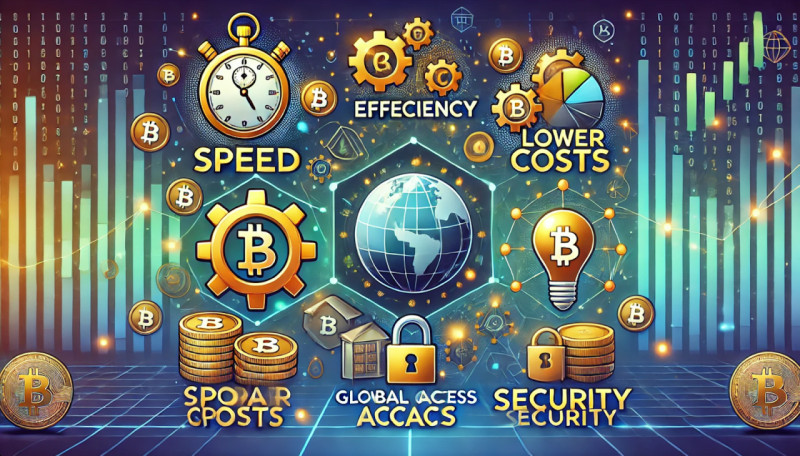
Advantages of Blockchain-Based Transactions
Speed, Efficiency
Transactions on blockchain networks are faster compared to traditional systems. Payments can be completed in minutes, regardless of location or banking hours.
- Instant global transfers: cross-border payments bypass intermediaries, avoiding delays common in traditional systems.
- Round-the-clock access: payments are processed anytime, removing reliance on standard operating schedules.
- Example: platforms like Travala enable real-time bookings for flights, accommodations using blockchain-based currencies and expand the list of what can you buy with cryptocurrency.
Lower Costs
Traditional systems involve high fees for international transfers, currency exchanges, or credit card processing. Blockchain alternatives minimize costs by removing intermediaries.
- Minimal fees: sending funds over networks like Bitcoin or Litecoin incurs significantly lower fees.
- Cost-effective remittances: migrant workers can send earnings back home without excessive overhead.
Global Access
Digital currencies offer financial inclusion, especially for individuals in underbanked regions.
- Banking for the unbanked: with just a smartphone, users in remote areas can participate in global commerce.
- Universal currency: assets bypass the need for currency conversion, simplifying international transactions.
- Example: freelancers, remote workers can accept payments globally without exchange rate concerns.
Privacy, Security
Blockchain technology encrypts transactions, protects user data, enhancing both privacy along with security.
- Reduced fraud risk: payments don’t expose sensitive details like credit card numbers, lowering identity theft risks.
- Pseudonymity: user identities remain masked unless linked to centralized systems.
Challenges of Using Cryptocurrency
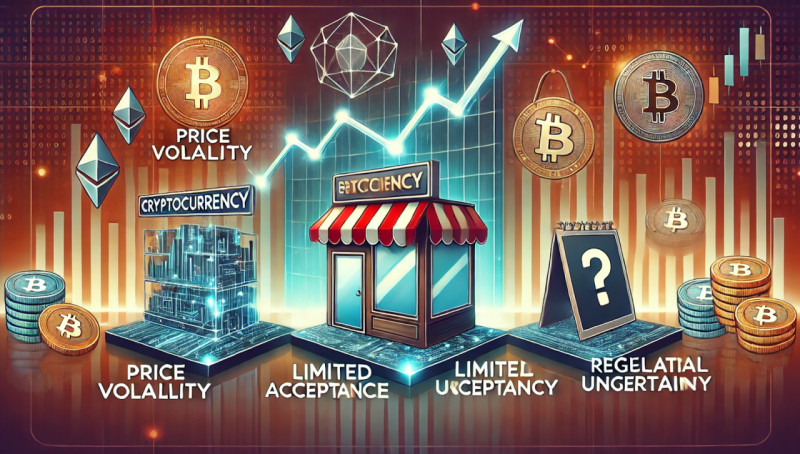
Price Volatility
The fluctuating value of digital assets poses challenges for consumers, merchants.
- Merchant risks: sellers may see reduced margins if values drop before conversion to fiat.
- Buyer hesitation: consumers may avoid spending assets during volatile periods to prevent value loss.
- Example: stablecoins like USDT offer solutions, but their adoption remains limited among businesses.
Limited Acceptance
Despite growing adoption, many businesses haven’t integrated blockchain transactions into their systems.
- Merchant availability: while platforms like Overstock accept Bitcoin, many local stores still rely on traditional currencies.
- Infrastructure gaps: limited internet access or low digital literacy slows adoption in some regions.
Regulatory Uncertainty
Governments worldwide are still defining frameworks for digital assets, leading to legal ambiguities.
- Tax implications: users must track gains and losses, which complicates compliance.
- Legal restrictions: some countries impose strict regulations or bans on blockchain-based payments.
- Example: El Salvador adopted Bitcoin as legal tender, while China restricts its commercial use.
Balancing the Pros, Cons
Tips for Maximizing Advantages
Use stable assets: opt for stablecoins like USDT to reduce volatility risks.
Leverage cost savings: compare transaction fees on different blockchains for frequent payments.
Seek merchants: explore businesses that accept blockchain transactions to broaden spending opportunities.
Addressing Challenges
Stay updated: follow local laws, tax requirements for smooth compliance.
Diversify options: maintain a mix of blockchain, fiat methods to navigate limited acceptance or price fluctuations.
Promote awareness: educate others about the benefits, proper usage of blockchain technology to encourage broader adoption.
Transforming Transactions with Blockchain
Blockchain currencies have proven their value in creating faster, more cost-effective, inclusive systems. While issues like volatility, regulation persist, thoughtful strategies help users harness the benefits effectively. Exploring the buying power of digital assets becomes more rewarding when users comprehend the opportunities as well as limitations, enabling them to embrace a modern, decentralized approach to financial transactions.
The Future of Spending Cryptocurrency
The things you can pay for with cryptocurrency is no longer a limited question—it’s evolving into a blueprint for the future of commerce. Blockchain-based assets are driving change in how value is exchanged, spanning daily purchases, major investments, charitable contributions. Emerging trends, sectoral growth, solutions to existing challenges indicate that blockchain payments are set to become as ubiquitous as traditional methods, enlarging the list of what can you buy with cryptocurrency.
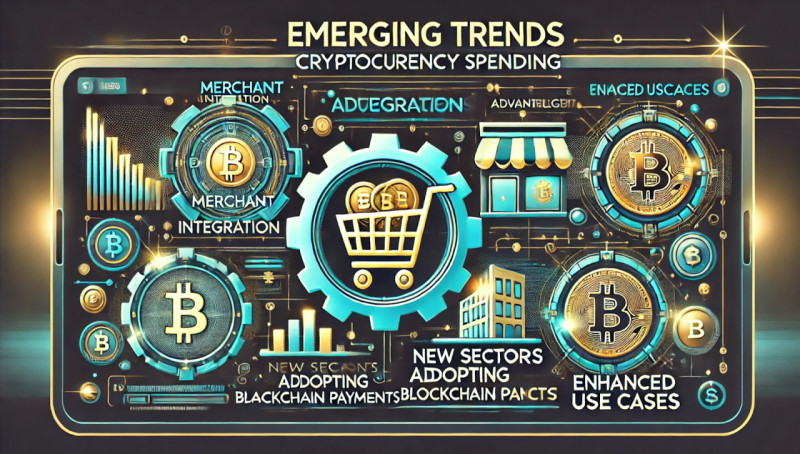
Emerging Trends
Merchant Integration
More businesses globally are incorporating blockchain into their systems as demand for alternative payments grows.
- Retail giants: major chains, from electronics to fashion, are piloting blockchain options, signaling acceptance across mainstream commerce.
- Local enterprises: independent businesses see these systems as cost-effective alternatives, reducing transaction fees, enabling quicker processing.
- Streamlined gateways: services like BitPay or Coinbase Commerce simplify adoption by bridging traditional infrastructure with decentralized currency systems.
Advancements in Technology
Innovative tools are making blockchain transactions more seamless for both users and businesses.
- Point-of-sale systems: many physical locations now feature terminals capable of processing blockchain payments.
- Instant cross-border payments: transactions bypass exchange rates, intermediaries, ideal for global commerce.
- In-app integrations: mobile applications enable users to shop, settle bills, or book services directly from wallets.
Potential Expansion
New Sectors Adopting Blockchain Payments
Industries previously hesitant are beginning to embrace blockchain as its advantages become clear.
- Real estate: property transactions can be completed using blockchain, with smart contracts streamlining ownership transfers.
- Healthcare: medical services are exploring blockchain for efficient, transparent billing processes.
- Public services: governments experimenting with central bank digital currencies (CBDCs) may soon integrate them for taxes, licenses.
Enhanced Use Cases
Decentralized finance (DeFi) is expanding how assets can be spent. Future possibilities include staking for discounts or earning rewards within merchant ecosystems.
Addressing Challenges
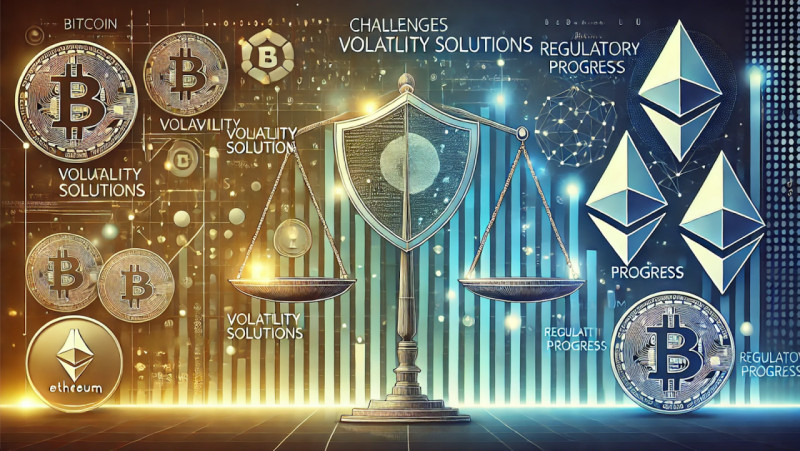
Volatility Solutions
Price fluctuations deter some users, businesses, but stablecoins tied to fiat currencies or commodities address this issue effectively.
- Predictability for merchants: stablecoins offer consistency, making them attractive for commerce.
- Broader acceptance: their integration into payment systems fosters trust among consumers, businesses.
Regulatory Progress
Governments are creating clearer frameworks for blockchain assets, encouraging mainstream adoption.
- Tax clarity: defined rules simplify compliance, fostering confidence in users.
- Fraud safeguards: protections against misuse encourage both consumers, merchants to participate.
A Vision for the Future
Advances in merchant acceptance, technology, regulation point toward a world where blockchain payments are commonplace. The possibilities for the buying power of digital assets are poised to expand dramatically, encompassing everything from basic necessities to transformative investments.
- Stable ecosystems: tools like stablecoins or CBDCs will further reduce barriers.
- Integration across industries: as businesses adapt, blockchain systems will touch nearly every aspect of life.
- Increased accessibility: as adoption grows, users across diverse demographics will benefit.
Call to Action: Embrace Financial Evolution
Begin exploring opportunities within the blockchain ecosystem. Research businesses, platforms, wallets that support decentralized transactions.
- Engage responsibly: adopt secure practices, such as enabling two-factor authentication, tracking transactions.
- Stay informed: keep abreast of regulatory updates to navigate compliance confidently.
- Educate yourself: know blockchain’s mechanics to make informed decisions about incorporating it into your financial routine.
Closing: The Promise of Blockchain-Based Finance
Blockchain currencies are redefining global finance, transforming how value is exchanged. With growing adoption across personal as well as professional realms, they are shifting from niche technology to essential financial instruments.
As advancements in regulation, technology unfold, the potential for what can you buy with cryptocurrency will continue to expand. These assets are more than tools for commerce—they are gateways to financial independence, inclusivity, innovation. By embracing these systems, users join a global movement, shaping the future of money as well as commerce while exploring new horizons of opportunity.
Conclusion
The opportunities around the buying power of cryptocurrency are growing, showcasing the ability of blockchain assets to reshape commerce, personal finance. From daily necessities to exclusive luxury goods, global travel, innovative investments, impactful donations, the range of use cases demonstrates a shift toward decentralized systems. As industries increasingly integrate blockchain-based solutions, these assets are transitioning from niche tools into central elements of global financial ecosystems. This evolution underscores their adaptability, speed, security in facilitating transactions.
Recap: A World of Opportunities
Blockchain systems redefine how people engage with financial transactions, creating possibilities that were unimaginable just a decade ago. They merge practicality with innovation, offering solutions for a wide array of needs:
- Daily essentials: retailers are embracing blockchain for transactions involving groceries, clothing, household items, allowing people to connect their digital holdings to everyday spending.
- Luxury goods: high-end markets are welcoming blockchain payments, enabling seamless purchases of exclusive items like sports cars, custom jewelry, rare artworks.
- Travel, experiences: platforms now offer the convenience of booking flights, accommodations, unique experiences without the hassle of currency exchange or additional fees.
- Subscriptions, technology: streaming services, gaming platforms, productivity software increasingly support blockchain systems, making access to digital tools easier as well as more secure.
- Financial tools, wealth: from acquiring precious metals to trading tokenized stocks, engaging with decentralized finance (DeFi), these assets are revolutionizing wealth management.
- Charitable giving: nonprofit organizations now leverage blockchain to facilitate transparent, efficient donations, allowing contributors to track how their funds are used.
- Everyday services: freelancers, educators, wellness providers are integrating blockchain into their operations, offering flexible, inclusive payment options that transcend geographical limitations.
This growing utility showcases the ability of blockchain systems to empower users, enabling them to make decisions that align with their financial goals while taking advantage of the innovative solutions these systems provide.
Call to Action: Unlock the Potential
Exploring the buying power of digital assets highlights how blockchain systems redefine the experience of spending, investing. Adopting these tools is not only about convenience but also about embracing a future of financial freedom, efficiency.
- Start small: engage with businesses, platforms that accept blockchain payments. Experiment with small transactions, such as paying for coffee or subscribing to a streaming service.
- Learn the tools: know how wallets work, use blockchain explorers to track transactions, stay updated on the latest legal and regulatory developments.
- Adopt best practices: protect your digital holdings with strong security measures like two-factor authentication, regular transaction monitoring, secure storage solutions.
- Educate yourself: learn about tax implications, compliance requirements, strategies to maximize the advantages of blockchain transactions.
These steps ensure that users can confidently integrate blockchain into their daily lives, benefiting from lower fees, faster processing times, a broader range of global opportunities.
Closing Statement: Empowerment Through Blockchain
Blockchain technology is transforming the way value is exchanged, creating a future where decentralized systems are central to the global economy. The question what can you buy with cryptocurrency is increasingly answered by examples from all walks of life, reflecting how blockchain systems are reshaping commerce, empowering individuals.
These assets go beyond being tools for transactions; they represent financial empowerment, providing individuals with the opportunity to explore a borderless economy that is inclusive, transparent, efficient. By embracing this evolving financial landscape, users are not just adopting a technology—they are stepping into a future where innovation meets practicality. Whether for routine purchases, meaningful investments, or contributions to global causes, blockchain systems pave the way for a brighter, more interconnected world.
Recommended
How to Mine Cryptocurrency on PC
How to Mine Cryptocurrency on iPhone
How to earn interest on cryptocurrency
How to invest in cryptocurrency
How to create your own cryptocurrencies
















